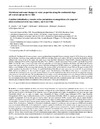Identificador persistente para citar o vincular este elemento:
https://accedacris.ulpgc.es/jspui/handle/10553/9674
| Título: | Meridional and zonal changes in water properties along the continental slope off central and northern Chile | Otros títulos: | Cambios latitudinales y zonales en los parámetros oceanográficos a lo largo del talud continental en la zona centro y norte de Chile | Autores/as: | Llanillo, P. J. Pelegrí Llopart, José Luis Duarte, Carlos M. Emelianov, Mikhail Gasser Rubinat, Marc Gourrion, J. Rodriguez-Santana, A. |
Clasificación UNESCO: | 251007 Oceanografía física | Palabras clave: | Análisis óptimo multiparamétrico cuasi-extendido Zona de mínimo oxígeno Masas de agua Sistema de la Corriente de Humboldt. |
Fecha de publicación: | 2012 | Publicación seriada: | Ciencias Marinas | Resumen: | The Humboldt-09 cruise covered a narrow meridional band along the Chilean continental slope (44?23º S). Here we use physical\nand biochemical data from a long meridional section (4000 km) and three short zonal sections (100 km) to describe the distribution of the\ndifferent water masses found in this region. Six water masses were identified: Subantarctic Water (SAAW), Summer Subantarctic Water\n(SSAW), Subtropical Water (STW), Equatorial Subsurface Water (ESSW), Antarctic Intermediate Water (AAIW), and Pacific Deep Water\n(PDW). For the first time, a novel set of source water mass properties (or water types) is introduced for SSAW, and nutrient and dissolved\noxygen water types are proposed for all the water masses. Optimum multiparameter (OMP) analysis was used through an iterative process to\nobtain a sound definition of the water types that minimizes the residuals of the method. Both the classic OMP and the quasi-extended OMP\nmodels reproduced the data rather well. Finally, the spatial distribution of the different water masses was calculated with the quasi-extended\nOMP, which is not influenced by the respiration of organic matter. The distribution of the different water masses is presented over the\nmeridional and zonal transects and in property-property diagrams. A smooth meridional transition from subantarctic to tropical and equatorial\nwater masses is observed in this area. This transition takes place in surface, central, and intermediate waters over distances of the order of 1000\nkm. The meridional transition contrasts with the abrupt zonal changes found in the cross-slope direction, which are of comparable magnitude\nbut over distances of the order of 100 km. Both AAIW and SAAW (fresh and well oxygenated) partially mix with the hypoxic ESSW and,\ntherefore, play an important role in the ventilation of the southern part of the oxygen minimum zone. | URI: | https://accedacris.ulpgc.es/handle/10553/9674 | ISSN: | 0185-3880 | DOI: | 10.7773/cm.v38i1B.1814 | Fuente: | Ciencias Marinas[ISSN 0185-3880],v. 38 (1B), p. 307-332 | Derechos: | by-nc-nd |
| Colección: | Artículos |
Citas SCOPUSTM
28
actualizado el 08-jun-2025
Citas de WEB OF SCIENCETM
Citations
27
actualizado el 08-jun-2025
Visitas
172
actualizado el 11-ene-2025
Descargas
174
actualizado el 11-ene-2025
Google ScholarTM
Verifica
Altmetric
Comparte
Exporta metadatos
Los elementos en ULPGC accedaCRIS están protegidos por derechos de autor con todos los derechos reservados, a menos que se indique lo contrario.
